In the north-west of Wales lies a small town with a pretty French name. And it deserves it, because it is a very pretty little town with a lovely medieval castle in an incredibly beautiful location…
Page Contents (click line to jump the text)
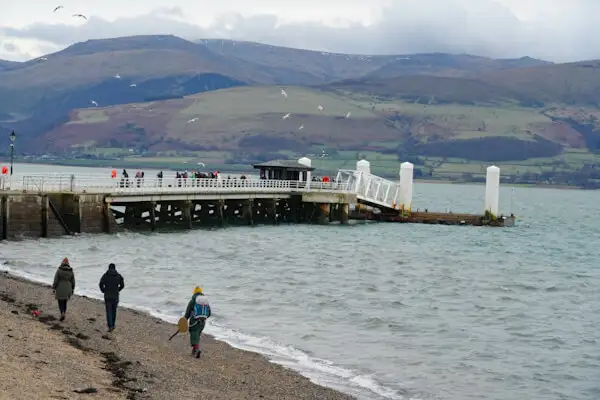
Intro and travel report
How did a pretty little town in north-west Wales get a French name? We investigate the question:
Anglesey is the most unspoilt part of Wales, the last bastion of Celtic culture in English-occupied Wales.
But French influence has obviously also crept in, as the name is clearly French. It comes from the French name ‘beau marais’, which means ‘beautiful marsh’ in English and ‘beautiful swamp’ in German (I am from Germany…).
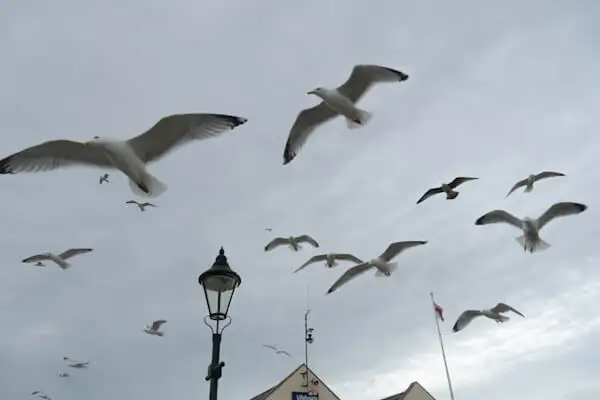
In the Middle Ages, England and the British Isles were ruled by rulers of Anglo-Norman descent, i.e. nobles who came from Normandy in France and also spoke French.
But what makes the marsh in north-west Wales so beautiful? The location!!! The marshes were probably originally alluvial and wet meadows on the shore, which were later drained.
The marsh is no longer a marsh and when you stand on the spacious lawn in front of the quay wall, you can look out over a large, wide bay, the opposite shore and partly out to the open sea – the North Sea.
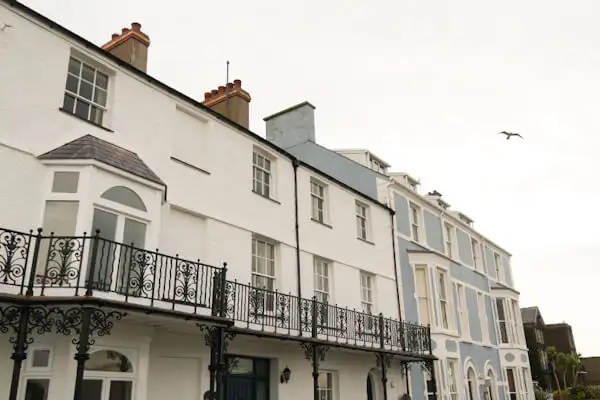
On the other shore, rugged, majestic mountains rise up that could not be more beautiful: Like the Scottish Highlands, only in Wales. These are the foothills of Snowdonia, a beautiful mountainous nature reserve. The name is apt, because when we were here at the end of February, there was actually some snow on the peaks.
We had a wonderful drive on the way to Beaumaris, on winding narrow roads along the water’s edge. It is an arm of the sea that separates the island of Anglesey from the mainland. Several bridges lead to the other side. At its narrowest point, you could mistake the inlet for a river, but at Beaumaris it opens up into a beautiful bay.
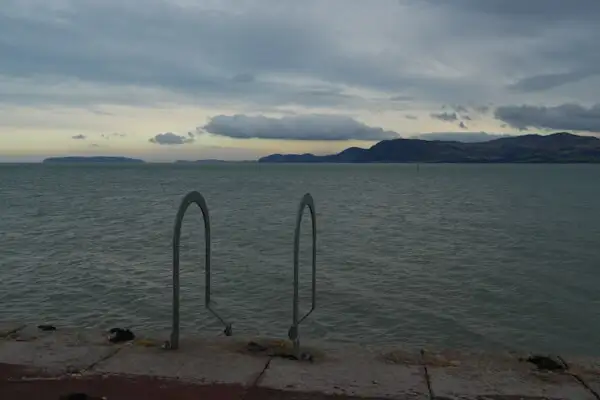
When we arrived in Beaumaris, we immediately noticed the beautiful colourful houses. This is a tourist town, but that is also a good thing, because tourism brings in money and most of the old buildings are beautifully renovated and preserved.
The highlight of Beaumaris is the castle. Built as a moated castle in perfect geometry, it is one of the most beautiful castles in Wales – and there are an incredible number of castles in Wales!
It was already late afternoon. The sun was setting early and I didn’t have much time to take a few photos. A short walk around the town and half a walk around Beaumaris Castle, which was already closed, unfortunately. I like seeing castles, even from the inside.
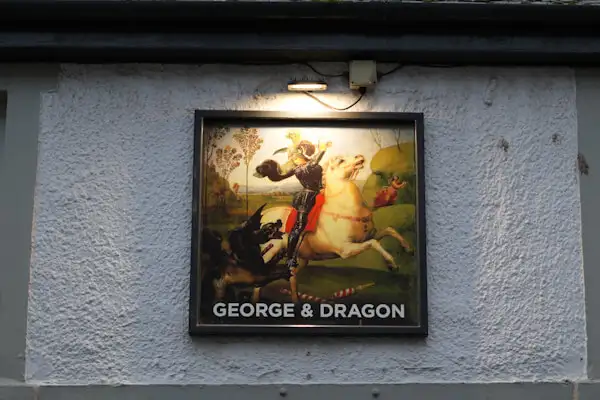
But the pretty ruins were also a beautiful sight from the outside. There is a children’s playground next to the castle and children were playing football on a meadow in front of it – the Walser are probably just as family-friendly as the Irish – nice!
A few metres further on, you can stroll along the shore on large grassy areas (the former swamp, I suppose). More families and children playing. The locals enjoy the beautiful location in the afternoon just as much as the few tourists (in February). There is a small pier and a small sports boat harbour and a few metres further on you are back in the centre of the village: Nice little shops, restaurants, a hotel – just nice.
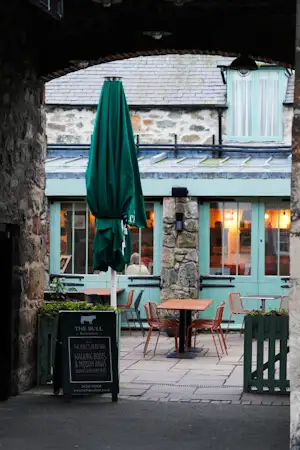
Standing on the shore, I look across the bay to the mountain ranges, which are cloaked in blue-black shadows in the early evening light, dotted with small white and colourful houses on the shore and on the slopes.
The sun sets a deep orange colour over the open bay and the clouds turn pink, then purple and settle down.
What to see and do in and around Beaumaris
Beaumaris Castle
Of course you have to see the castle – at least walk around it, or visit it from the inside, see: https://cadw.gov.wales/visit/places-to-visit/beaumaris-castle.
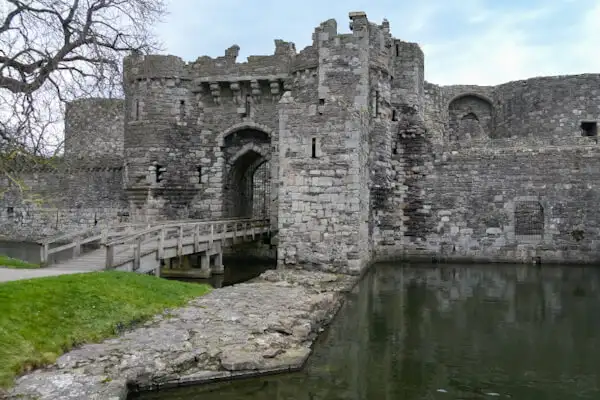
Beaumaris Gaol and Court
This is the historic courthouse and former prison of Beaumaris, which you can visit. See: https://www.visitanglesey.co.uk/en-gb/explore/beaumaris-gaol.
St Mary and St Nicolas Church
Lovely old church in the centre of Beaumaris – nice to see. Right in front is the War Memorial.
Beaumaris Seafront and Pier
Be sure to take a walk along the seafront and onto the pier. Here you have the best views of the bay and the mountains beyond.
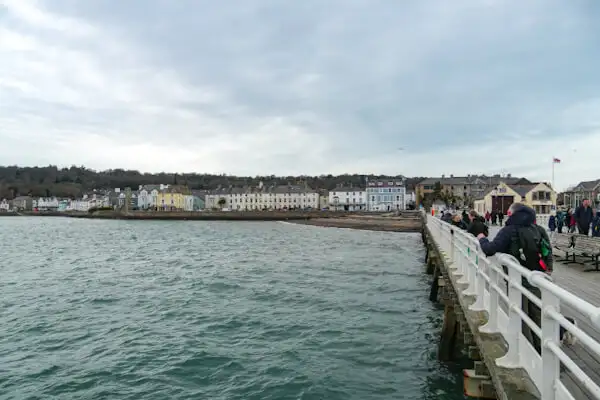
Puffin tours
Puffins are super pretty parrot divers, diving seabirds that breed on the rugged cliffs of the English and Irish islands. You can visit them on a beautiful boat tour. See: https://www.seacoastsafaris.co.uk and https://starida.co.uk.
Lighthouses at Penmon Point
There are two beautiful lighthouses and a beach at Penmon Point, a headland near Beaumaris.
Aberlleiniog Castle
Small castle ruins, enchanted and hidden in the forest on a hill. You will pass by here on the way to Penmon Point.
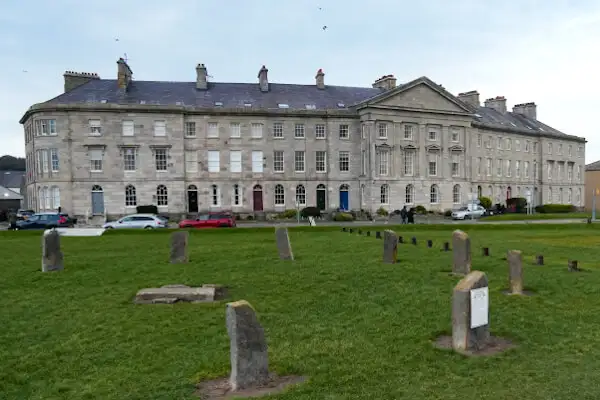
Other highlights in the surrounding area
Anglesey is not big, so you can easily drive to the South Stack Lighthouse near Holyhead, or take the bridge across the strait to Caernarfon, where you can see a great castle and the remains of a Roman bathhouse. Yes, the Romans were here too! Penrhyn Castle near Bangor can also be found on the other shore, virtually opposite Beaumaris – a magnificent castle with a great interior. Another beautiful headland with a lighthouse and long sandy beaches can be found at Goleudy Twr Mawr.
The last name is unpronounceable for non-natives and you will come across similar unpronounceable names and ‘tongue twisters’ very often in Wales… 🙂
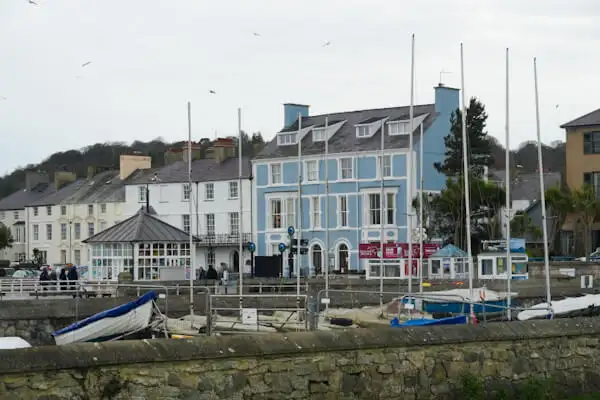
(Brief) history of Beaumaris
I’ve already anticipated a lot (it often happens to me…): Beaumaris was built in the Middle Ages as a castle by the Anglo-Norman-English conquerors to better control the rebellious Celtic population of Wales. Beaumaris thus followed a whole series of castles built by the English in Wales, especially around Anglesey.
The English had subjugated the Celtic population of Wales in many warlike conflicts and gradually pushed them westwards and north-westwards. For a time, the island of Anglesey was easy to defend and was one of the last refuges of the Britons, Britannians or island Celts.
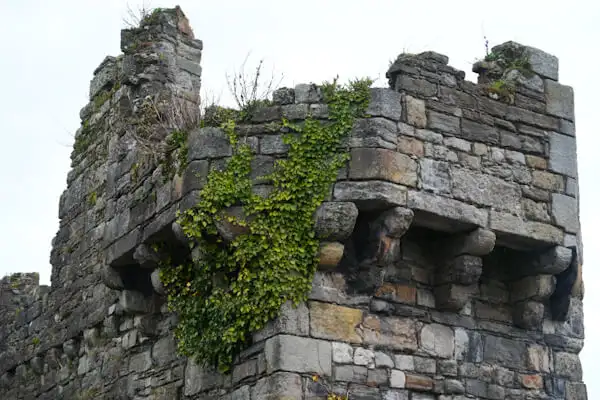
For some time Vikings dominated many of the coasts of England (and Ireland) and also had a fortified harbour and trading base at Beaumaris called Porth y Wygyr or Port of the Vikings. It really is incredible where the Vikings were.
The English (or Anglo-Norman) King Edward I commissioned the building of a whole series of castles in Wales. Edward’s dream was to unite all parts of the islands, which he largely achieved, including Wales. The present-day kingdom of England and Wales was thus largely created by Edward I. However, he was unable to conquer Scotland.
Work at Beaumaris began in 1295. The master builder was James of Saint George, who had already built other castles for Edward I, this being the last. The layout of the castle is perfectly symmetrical with an inner castle, an outer wall and a moat.
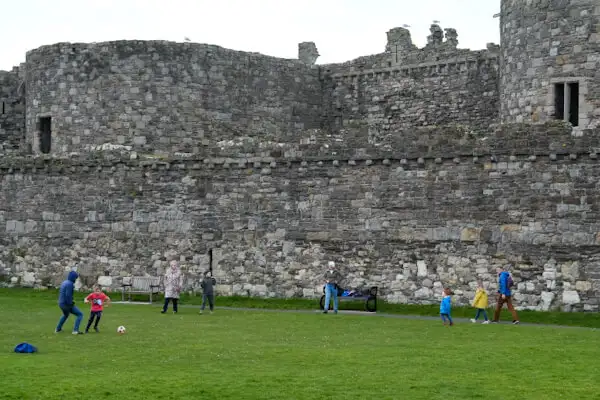
However, construction work was stopped in 1330 because the builder ran out of money. The castle was never fully completed. Today it is one of UNESCO’s World Heritage Sites.
As was so often the case in the Middle Ages, a settlement grew up next to the castle, which later became a small town. Today, Beaumaris is a nice little town with a pretty town hall, a pretty church and nice shops.
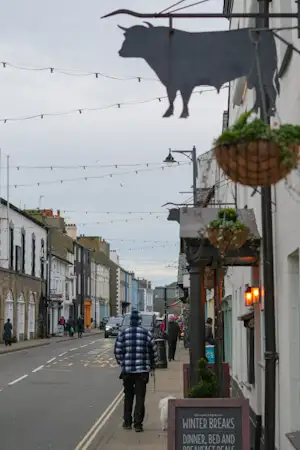
The population of Beaumaris is true to its Celtic-Welsh traditions: more than half of the population can still read, speak, write or understand Welsh and for many, Welsh or Cymric is the first language and English the second. The proportion is likely to increase, as Welsh has been taught in schools again for several years, just like (gealic) Irish in Irish schools.
The Celtic languages on the British and Irish Isles are closely related and can be traced back to the Gaelic-Celtic language family. However, they have developed differently over the millennia, perhaps comparable to German and Dutch, or Frisian and Bavarian (I come from Germany, hence these examples).
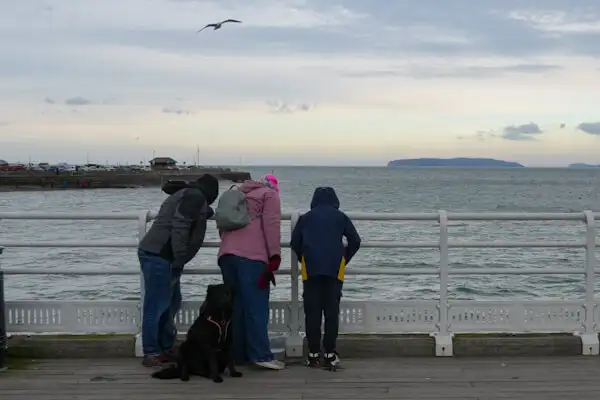
Practical travel tips to Beaumaris
The island of Anglesey lies in the far north-west of Wales and is a small world of its own. Here, Wales is still Wales. Several of the most beautiful castles in Wales are located on Anglesey, as well as many lovely little villages. The coastline is also breathtakingly beautiful and the mountains of Snowdonia are only a short drive away.
From Holyhead you can take the ferry to Dublin, making it easy to combine Anglesey and the north of Wales with a trip to Ireland.
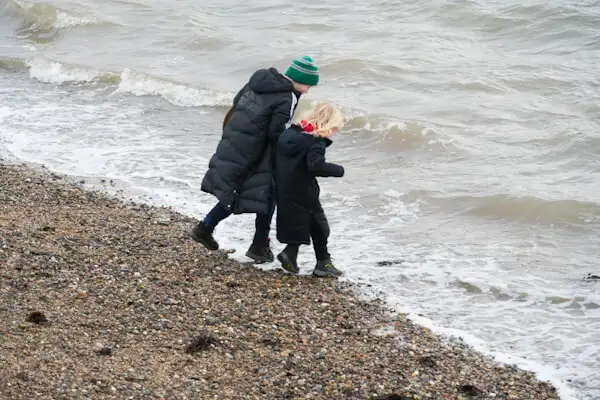
Beaumaris is a beautiful and highly recommended stop on your journey through the north of Wales, which is also suitable for several overnight stays due to its proximity to many highlights.
There are several places to stay in and around Beaumaris, which you can easily find via established booking portals (like booking.com for example).
Conclusion
We really enjoyed our short visit to Beaumaris and I’m sure you’ll love it too. The small town is very nice and invites you to stroll around.
With Beaumaris Castle and a few other highlights in the area, it has some beautiful sights to offer.
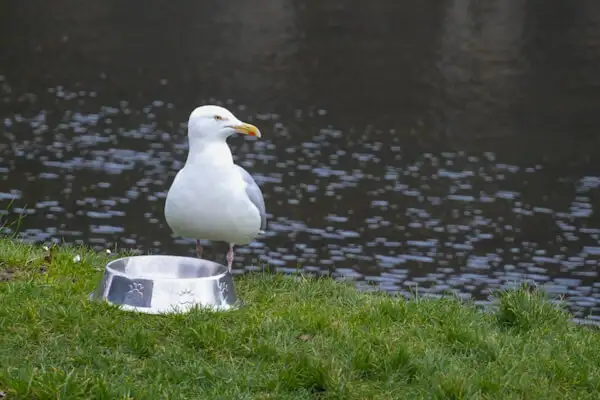
The drive along the coast of the strait is super beautiful and the view across the bay to the mountains in the background is breathtaking.
You can make a short visit here, stay overnight, or even stay for several days and explore the area – a lot is possible here.
And with that, I hope you have lots of fun in Wales and in Beaumaris, the ‘beautiful marsh’!
More interesting arcticles for you
A trip through the north and west of Wales
Llandudno: Marvelous seaside resort in the north of Wales
Aberystwyth: Lively west coast (of Wales)
Touring Cornwall
Picture credits cover picture: Beaumaris Castle (Photo: Ulrich Knüppel-Gertberg)